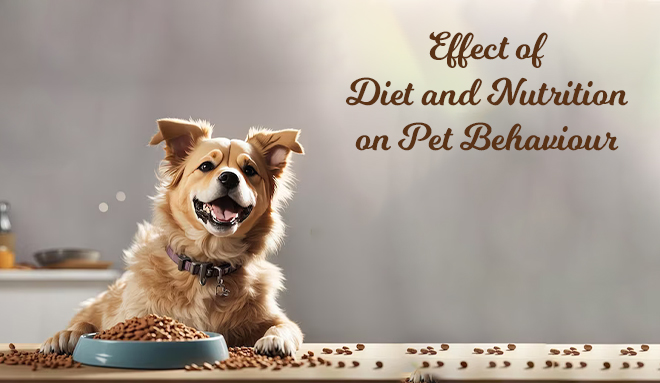
While nurturing our pets, we often tend to focus on their physical health and need for exercise. Unfortunately, we do not always realise that their mental health holds a lot of importance too. Similar to us, the food our pets eat can impact their behaviour. The diet they eat plays an important role in their overall well-being including their mood and behavior.
In this article, we will explore the link between nutrition and pet behaviour and will help you understand how to plan your pet’s diet that will lead to their happiness and optimum behaviour.
Relationship between Diet and Behaviour
We usually do not link our pets’ behaviour with their diet. However, according to studies, there is a strong connection between the food that our pets eat and how they behave. Understanding this relationship can help us make conscious choices while offering them the required nutrition.
Nutrients for Optimal Behaviour
When it comes to offering your pet a well-balanced diet, always make sure to include a combination of essential nutrients. These nutrients directly influence their mood, behaviour and brain function.
Let’s explore the key nutrients that make a difference to a pet’s well-being and overall behaviour.
- Protein
A diet that is high in protein can significantly affect behaviour in dogs. If they consume a diet containing too much protein, it can lead to anxiety, aggression, restlessness, light sleep and depression. Excessive protein can also worsen existing nervous system issues like post-traumatic disorder.
Cats, on the other hand, require more protein in their diet than dogs. Serotonin present in protein regulates cat behaviour including cat’s sleep-wake cycles, mood, sensitivity to pain/stimuli and level of arousal. Deficit of this element may lead to hyperactivity, aggression, restless sleep and hypersensitivity.
- Fats and Fatty Acids
Certain fats and fatty acids are crucial for your pet’s behaviour and brain health. Fatty acids like DHA, are important for a dog’s brain development and are likely to affect cognitive performance and behaviour. According to studies, puppies that were fed fatty acids showed improved nervous development.
Even kittens and older cats benefit a lot from fatty acids. While DHA helps kittens with brain development, senior cats benefit from fatty acids to maintain their mental health in their golden years.
- Carbohydrates and Energy
Carbohydrates do have an impact on both dogs’ and cats’ behaviour but it depends upon the type and quality of carbohydrates consumed. Processed foods generally come with large quantities of carbohydrates which cause a spike in their blood sugar levels. This results in extreme hyperactivity for a limited period when they display destruction, overzealous biting or rough play, followed by lethargy for some time as their body tries to compensate for the imbalance.
- Vitamins and Minerals
Micronutrients including vitamins and minerals are crucial for a pet’s overall behaviour and well-being. Vitamin B1 is essential for the health of your doggo’s brain. Its deficiency can lead to neurological problems. When it comes to minerals, Omega-3 fatty acids reduce anxiety and maintain your pooch’s mood.
As far as felines are concerned, vitamin D helps to maintain their nervous system and helps it to function properly. Deficiency of this vitamin can lead to seizures. Minerals such as potassium and sodium have an important part to play in their well-being. Potassium maintains nerve function and sodium powers nerve impulses.
Conclusion
Now that you’ve recognised the important role of nutrition in pet behaviour, we’re sure that you will be able to make informed choices while planning your furry balls’ diet. You can make a significant impact on their energy levels, mood and overall behaviour by offering them a nutritious and well-balanced diet. Prioritising their nutrition will help us take an important step toward ensuring their well-being and happiness.
If in doubt, you can always seek the advice of your veterinarian for the ideal diet for your pet. With the help of optimal nutrition, your pet will thrive physically and mentally, which will in return strengthen the bond that you share with them.


